Zscaler Bundle
How Does Zscaler Stack Up in the Cloud Security Arena?
In an era dominated by cloud adoption and remote work, understanding the Zscaler SWOT Analysis is crucial. Zscaler has revolutionized network security with its Security Service Edge (SSE) platform, but how does it fare against its rivals? This exploration delves into the Zscaler competitive landscape, dissecting its position within the dynamic cloud security market.
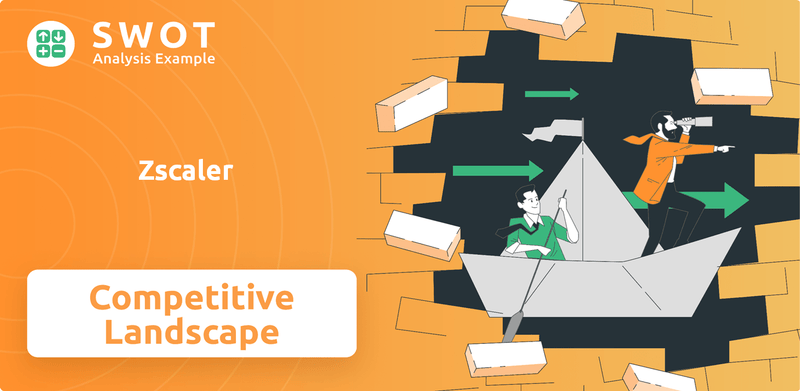
This analysis provides a comprehensive look at Zscaler's key competitors and their strategies, offering valuable insights for investors and business strategists. We'll examine the Zscaler competitors, their strengths, and weaknesses, and how they compare in terms of features, pricing, and market share. This Zscaler market analysis will also cover the latest trends in cloud security vendors and SASE providers, helping you make informed decisions in this rapidly evolving sector, including details on Zero trust security.
Where Does Zscaler’ Stand in the Current Market?
The company holds a strong market position in the cloud security industry, especially within the Security Service Edge (SSE) segment. It's recognized as a leader in Gartner's Magic Quadrant for SSE, which highlights its vision and execution capabilities. This recognition is a key factor in understanding the overall Zscaler competitive landscape.
The company's main products, Zscaler Internet Access (ZIA) and Zscaler Private Access (ZPA), are the core of its Zero Trust Exchange platform. ZIA offers secure web gateway, cloud firewall, and threat protection, while ZPA provides secure, direct-to-app connectivity for remote users. These offerings are critical for enterprises navigating the complexities of modern cybersecurity.
The company's financial health is robust, demonstrating its scale and stability. For the third quarter of fiscal year 2024, Zscaler reported revenues of $553.0 million, marking a 32% year-over-year increase. The company projects total revenue for fiscal year 2024 to be between $2.182 billion and $2.186 billion. This financial performance is a key indicator when conducting a Zscaler market analysis.
The company is a leader in the Security Service Edge (SSE) market, as recognized by Gartner. This leadership position is a significant competitive advantage. This is a crucial aspect when considering Zscaler and its competitors comparison.
The core of the company's offering is its Zero Trust Exchange platform. This platform integrates ZIA and ZPA to provide comprehensive security solutions. This platform approach is central to its value proposition.
The company serves a diverse customer base, including large enterprises and government agencies. It has a strong presence across North America, Europe, and Asia. Its broad customer reach supports its market position.
The company demonstrates consistent revenue growth and a focus on profitability. This financial strength is a key differentiator. The company's fiscal year 2024 revenue projections are a testament to its growth.
The company's strengths include its market leadership in SSE, its Zero Trust Exchange platform, and its strong financial performance. These factors contribute to its competitive advantages. Understanding these points provides insight into Zscaler's competitive advantages.
- Leading position in the SSE market.
- Comprehensive Zero Trust security platform.
- Robust financial health and consistent revenue growth.
- Strong presence in large, globally distributed enterprises.
Zscaler SWOT Analysis
- Complete SWOT Breakdown
- Fully Customizable
- Editable in Excel & Word
- Professional Formatting
- Investor-Ready Format
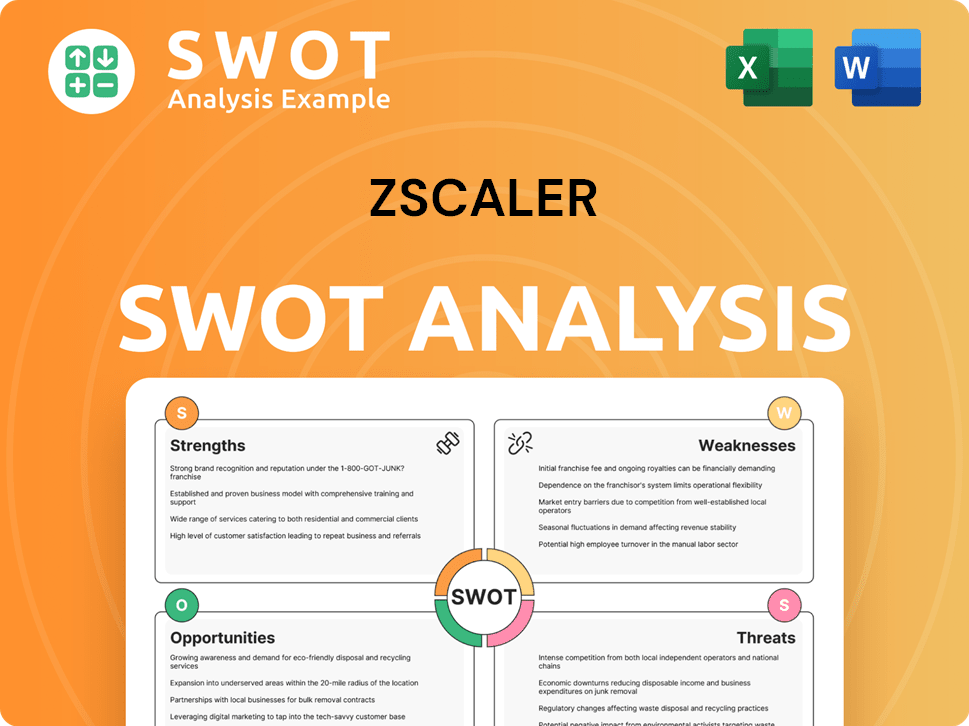
Who Are the Main Competitors Challenging Zscaler?
The cloud security market is intensely competitive, and the Zscaler competitive landscape is shaped by a mix of established cybersecurity firms and emerging players. These competitors challenge Zscaler's market position through direct and indirect strategies, focusing on features, performance, and integration capabilities. Understanding the Zscaler market analysis requires a close look at these key players and their approaches to the evolving security needs of businesses.
The Zscaler competitors include companies that offer similar security solutions, as well as those that approach the market from different angles. The competition is dynamic, with mergers, acquisitions, and evolving product offerings constantly reshaping the landscape. This constant change means that businesses need to stay informed to make the best decisions for their security needs.
Direct competitors offer similar cloud-based security services, directly challenging Zscaler's market share. These companies compete on features, performance, and integration capabilities. The competition is particularly intense in the SASE and Zero Trust security spaces.
Palo Alto Networks is a major competitor with its Prisma SASE offering. Prisma SASE integrates network security and SD-WAN, directly competing with Zscaler's Zero Trust Exchange. Palo Alto Networks has a strong presence in the enterprise market.
Fortinet, known for its FortiGate firewalls, also competes in the cloud security market with FortiSASE. Fortinet's focus on integrated security solutions makes it a strong contender. Fortinet's market share continues to grow in the cloud security space.
Cisco, with its extensive networking and security solutions, including Cisco Secure Access, is another significant competitor. Cisco's established customer base and broad product portfolio allow it to compete effectively. The company's market position is strengthened by its integrated approach to security.
Indirect competitors include traditional network security vendors adapting to cloud environments and hyperscale cloud providers. These companies may offer security services as part of broader platforms, creating indirect competition. The competitive landscape is constantly evolving due to mergers and acquisitions.
Traditional vendors are adapting their offerings for cloud environments, expanding their market reach. These vendors often have established customer relationships and brand recognition. They pose a threat by evolving their products to meet cloud security demands.
The market is also influenced by hyperscale cloud providers like AWS and Microsoft Azure, which offer native security services. These services can compete with aspects of Zscaler's platform for certain use cases. Emerging players in the SSE and Zero Trust space can also pose a threat. The competitive landscape is dynamic, with ongoing mergers and acquisitions, like Broadcom's acquisition of VMware's security assets, further reshaping market dynamics. For more insights into Zscaler's market position, consider reading about the Target Market of Zscaler.
Several factors determine success in the cloud security market, including product features, performance, and integration capabilities. Companies often compete for large enterprise contracts, differentiating themselves through these key areas.
- Features: The range and sophistication of security features offered.
- Performance: The speed and efficiency of security services.
- Integration: The ability to seamlessly integrate with existing IT infrastructures.
- Pricing: Competitive pricing models and plans.
- Customer Support: The level of customer service and support provided.
Zscaler PESTLE Analysis
- Covers All 6 PESTLE Categories
- No Research Needed – Save Hours of Work
- Built by Experts, Trusted by Consultants
- Instant Download, Ready to Use
- 100% Editable, Fully Customizable
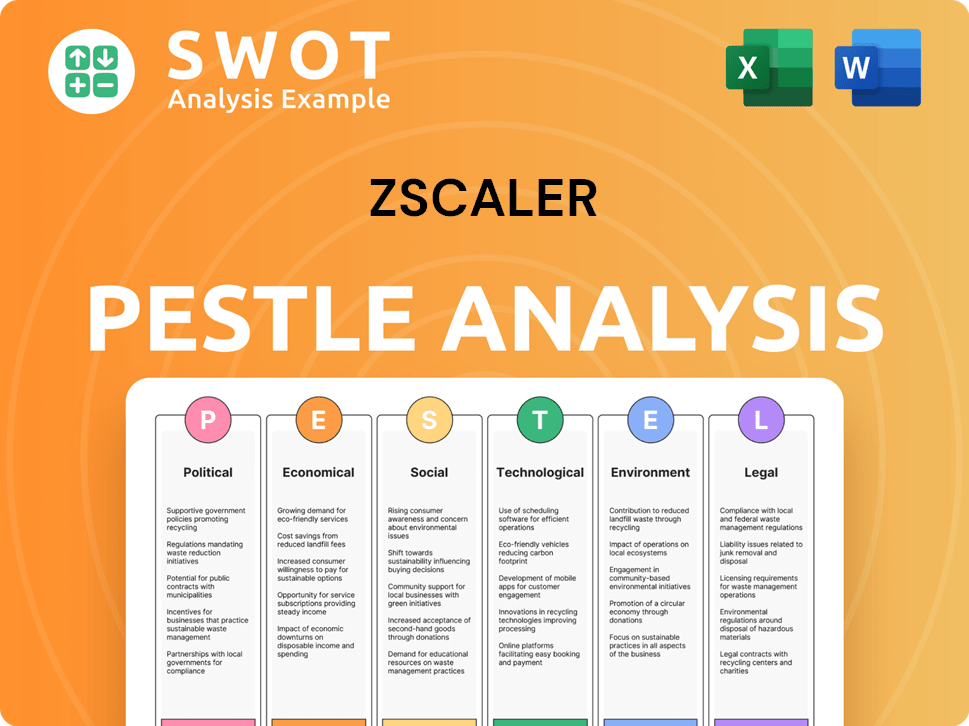
What Gives Zscaler a Competitive Edge Over Its Rivals?
The competitive landscape for cloud security vendors is dynamic, with companies like Zscaler vying for market share. Understanding Zscaler's competitive advantages is crucial for investors and businesses evaluating their security strategies. This involves analyzing its core strengths, strategic positioning, and how it differentiates itself from competitors. A thorough Zscaler market analysis reveals key factors driving its success in the Zero Trust security and SASE providers space.
Zscaler's approach to cloud security, built from the ground up, sets it apart. Unlike competitors that adapted existing solutions, Zscaler's architecture is designed for the cloud, offering scalability and performance. This foundational difference allows for efficient processing of massive transaction volumes, ensuring consistent security policies globally. Examining Zscaler's strengths and weaknesses provides insights into its ability to maintain its position in the market.
The company's focus on a true Zero Trust model, where no user or device is inherently trusted, is a key differentiator. This approach is highly effective in preventing lateral movement of threats and protecting against advanced attacks. The company's early mover advantage in cloud-delivered security has allowed it to build a substantial customer base and gain valuable insights into enterprise security needs. For a deeper dive into the company's origins, consider reading the Brief History of Zscaler.
Zscaler's cloud-native architecture offers unparalleled scalability and performance. This design allows for processing trillions of transactions daily. This architecture is a significant advantage over competitors with legacy solutions.
Zscaler's extensive global network of data centers, or Points of Presence (PoPs), brings security closer to users. This distributed infrastructure minimizes latency, ensuring a fast, secure experience regardless of location. This global reach is a critical factor in the Zscaler competitive landscape.
Zscaler's Zero Trust model, where no user or device is inherently trusted, is a key differentiator. This approach is highly effective in preventing lateral movement of threats. This model is a core element of Zscaler's strategy.
Zscaler has built strong brand equity, particularly among large enterprises. This early mover advantage has helped build a substantial customer base. Sustained customer loyalty is a key advantage.
Zscaler sustains its advantages through continuous innovation, a strong patent portfolio, and strategic partnerships. While imitation is a threat, Zscaler's deep technical expertise and established platform make it challenging for competitors to replicate its capabilities and global scale. Understanding Zscaler's key features and benefits helps to understand its market position.
- Continuous Innovation: Zscaler invests heavily in research and development to stay ahead of emerging threats and evolving customer needs.
- Strong Patent Portfolio: A robust patent portfolio protects Zscaler's proprietary technologies and innovations.
- Strategic Partnerships: Collaborations with other technology providers enhance Zscaler's offerings and expand its market reach.
- Customer Retention: Zscaler's focus on customer satisfaction and support contributes to high retention rates.
Zscaler Business Model Canvas
- Complete 9-Block Business Model Canvas
- Effortlessly Communicate Your Business Strategy
- Investor-Ready BMC Format
- 100% Editable and Customizable
- Clear and Structured Layout
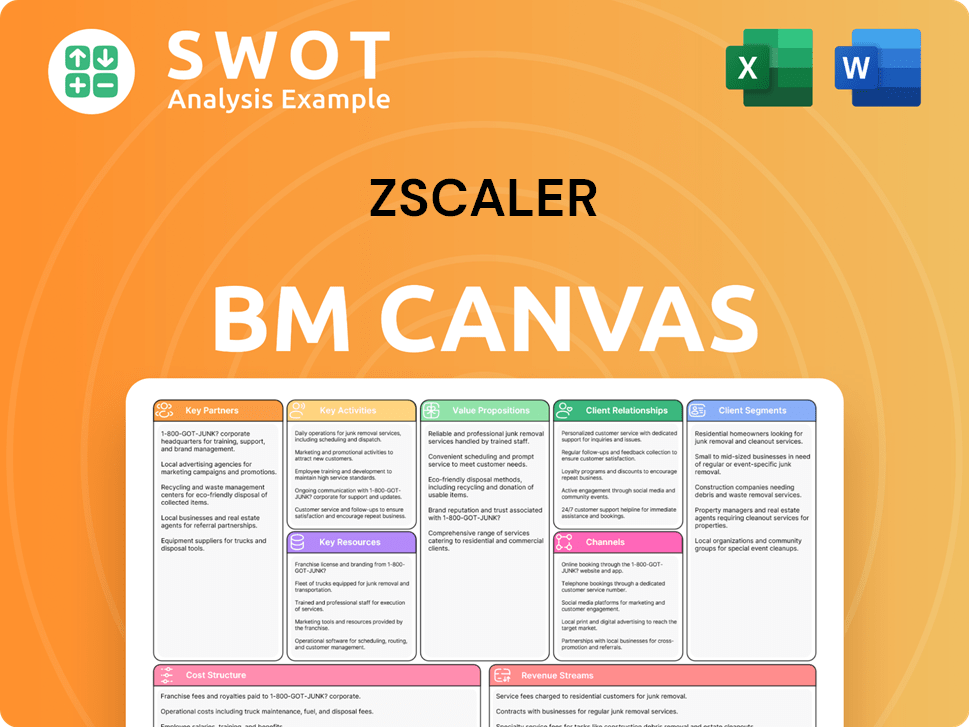
What Industry Trends Are Reshaping Zscaler’s Competitive Landscape?
The cloud security industry is experiencing significant shifts, driven by the acceleration of cloud adoption, the rise of remote work, and increasingly sophisticated cyber threats. These trends present both opportunities and challenges for companies like Zscaler. Understanding the Zscaler competitive landscape requires a deep dive into these industry dynamics to assess its future outlook.
As organizations move towards Zero Trust architectures, the demand for robust security solutions is growing. Regulatory changes, such as stricter data privacy laws, further drive the need for strong security measures. This environment creates both risks and opportunities for Zscaler and its competitors comparison, influencing their market positions and strategic decisions.
Cloud adoption continues to accelerate, with a projected global market size of $800 billion by the end of 2024. The shift towards remote and hybrid work models necessitates robust security solutions. The increasing sophistication of cyber threats, including ransomware and phishing attacks, demands advanced security measures.
The integration of AI and machine learning in cybersecurity is a growing trend, with AI-driven security spending expected to reach $96.3 billion by 2028. New market entrants and the potential for economic downturns impacting IT spending pose challenges. Intensified competition from large technology companies bundling security services is also a threat.
Expanding into emerging markets, where cloud adoption is still growing, offers significant opportunities. Developing new product innovations to address evolving threats, such as advanced phishing and ransomware, is crucial. Strategic partnerships with cloud providers and system integrators can facilitate market expansion.
Zscaler's strategies focus on continuous platform innovation, expanding its global footprint, and strengthening channel partnerships. The company is likely to deepen its integration of AI-driven threat intelligence and broaden platform capabilities. For more insight into their strategic direction, you can read about the Growth Strategy of Zscaler.
Zscaler's industry position is influenced by its ability to adapt to rapidly changing market dynamics. Key factors include the company's ability to innovate and integrate AI, its success in forming strategic partnerships, and its capacity to expand into new markets. Understanding these elements provides a comprehensive Zscaler market analysis.
- Zscaler's competitive advantages include its Zero Trust architecture and its focus on SASE (Secure Access Service Edge) solutions.
- The company faces competition from various cloud security vendors and Zscaler competitors.
- Zscaler's key features and benefits include comprehensive security, ease of deployment, and scalability.
- Zscaler's future outlook depends on its ability to navigate the evolving cybersecurity landscape and maintain its market share.
Zscaler Porter's Five Forces Analysis
- Covers All 5 Competitive Forces in Detail
- Structured for Consultants, Students, and Founders
- 100% Editable in Microsoft Word & Excel
- Instant Digital Download – Use Immediately
- Compatible with Mac & PC – Fully Unlocked
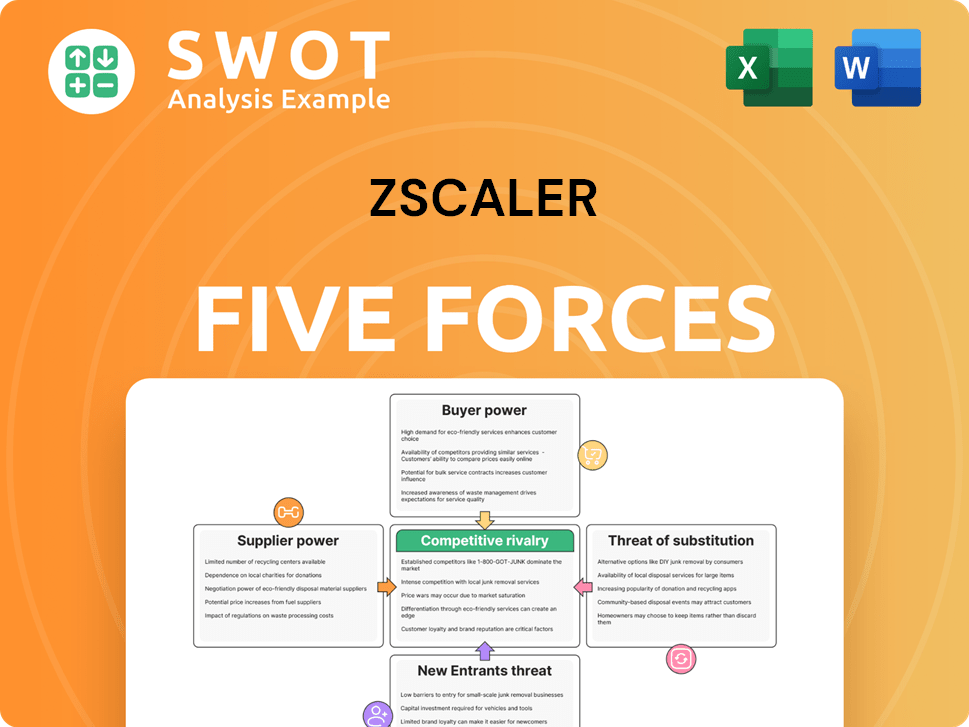
Related Blogs
- What are Mission Vision & Core Values of Zscaler Company?
- What is Growth Strategy and Future Prospects of Zscaler Company?
- How Does Zscaler Company Work?
- What is Sales and Marketing Strategy of Zscaler Company?
- What is Brief History of Zscaler Company?
- Who Owns Zscaler Company?
- What is Customer Demographics and Target Market of Zscaler Company?
Disclaimer
All information, articles, and product details provided on this website are for general informational and educational purposes only. We do not claim any ownership over, nor do we intend to infringe upon, any trademarks, copyrights, logos, brand names, or other intellectual property mentioned or depicted on this site. Such intellectual property remains the property of its respective owners, and any references here are made solely for identification or informational purposes, without implying any affiliation, endorsement, or partnership.
We make no representations or warranties, express or implied, regarding the accuracy, completeness, or suitability of any content or products presented. Nothing on this website should be construed as legal, tax, investment, financial, medical, or other professional advice. In addition, no part of this site—including articles or product references—constitutes a solicitation, recommendation, endorsement, advertisement, or offer to buy or sell any securities, franchises, or other financial instruments, particularly in jurisdictions where such activity would be unlawful.
All content is of a general nature and may not address the specific circumstances of any individual or entity. It is not a substitute for professional advice or services. Any actions you take based on the information provided here are strictly at your own risk. You accept full responsibility for any decisions or outcomes arising from your use of this website and agree to release us from any liability in connection with your use of, or reliance upon, the content or products found herein.